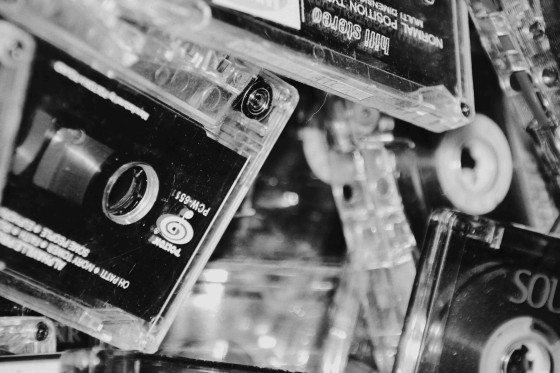What Is a Branded Podcast & Why Should You Create One?
Contents

Why start a branded podcast? Because it works.
In a world of forgettable content, podcasts are flipping the script for content marketing departments across the board. Thousands of businesses have begun to weave podcasts into their outreach strategies. Now, a brand podcast is not just another ad or sales pitch — it’s a way for your brand to connect with your community, tell stories, and provide real value in a format people actually want to consume.
Podcast consumption, in general, is on the rise, and brand podcasts are no different. Intimate and immersive by nature, they offer a rare opportunity for brands to connect with consumers without being too invasive.
"Podcasts are giving brands the unique opportunity to speak to audiences in a space like no other. It's an intimate environment with more than 90% of listening taking place in our headphones."
- Jack Preston, director of Acast Creative
This kind of connection matters more today than ever. Listeners appreciate authenticity, expertise, and a human voice — especially when choosing which brands to let into their routines.
Instead of interrupting your customer’s day, you’re adding something worth their time. And that brings you higher loyalty, greater awareness, and a chance for your brand to become a trusted, recognized voice in your industry. So let’s break down what a branded podcast really is, and why it might be your best move for growing your business.
What Is a Branded Podcast?
A branded podcast is a way for your business to connect with your audience through stories, conversations, and insightful content, instead of interrupting them with traditional ads.
In 2018, Fast Company called branded podcasts “the ads people actually want to listen to.”
BBC Global News suggests that branded or company podcasts are a highly effective way to reach consumers. But, unlike other channels, they're not precisely advertising or promotional.
What we're seeing is that the top-branded podcasts still drive from the heart of what makes a good quality podcast: great storytelling, fascinating conversations, and valuable content people want to listen to.
"They see incredibly high engagement rates—85% completion rates, which dwarf what we see in social and video. You have, then, the opportunity to develop real relationships with customers, prospects, and your industry at scale."
- Harry Morton, founder at Lower Street
Some of the most successful branded podcasts avoid directly promoting their products or services. Instead, they let their expertise, creativity, and authenticity speak for them. Take Beyond Retail with Adyen or Technology Untangled by HPE — both shows connect with their audiences through high-caliber stories and helpful information. This lets their brands become a recognized and trustworthy presence in the lives of their listeners.
Branded podcasts can come in all different formats and styles. There isn’t a set rule, and really the more you shape your podcast to stand out, the better results it is going to bring you.
You’ve probably noticed there are many interview-style chat casts out there. It’s a classic go-to. But switching up your branded podcast with narrative, a different genre like how Nickel & Crime brought financial security to true crime, or even a whole new niche (like Moneywise), is your best route to success.
Why You Should Start a Branded Podcast
So now you know what a branded podcast is, why should you convince management to invest in one?
A branded podcast is one of the most sure-fire ways to build thought leadership, increase brand awareness and trust, and create a loyal community within your audience.
If your goal is instant sales, a podcast might not be the best fit. But if you want to strengthen your brand’s position, connect with your audience on a human level (instead of just a transactional one), and drive long-term business results, then podcasting is for you.
The data speaks for itself. According to Signal Hill Insights, 61% of listeners say their opinion of a brand improves after listening to its show. The BBC found that branded podcasts lift engagement by 16% and loyalty by 12% — outperforming TV and radio. Brands that invest in their own shows see higher loyalty, greater awareness, and even a boost in purchase intent by up to 14%.
Effectiveness of Branded Podcasts
That BBC study is one of the best to show just how effective brand podcasts were, especially compared to radio and TV content. Researchers surveyed 2,500 consumers, using cutting-edge methods to measure respondents' "second-by-second brain activity" as they consumed podcast content.
If you look at the BBC study on brand podcasts you’ll see:
Branding stands out from the content, helping the message land with audiences.
Branded podcasts achieve unique cut-through with listeners who avoid ads.
Podcast listeners are active and will usually listen to a show when engaged in another activity such as housework or exercise.
Audiences who are listening while engaged in an activity are more receptive to brand messaging.
Branded podcasts create a positive association with that brand.
Brands are able to communicate with audiences during their downtime, which was usually seen as previously unreachable.
The overall study suggested that branded podcasts are more effective in reaching consumers than TV or radio ads. Also, they're ideal for catching ad avoiders and can contribute to 89% higher brand awareness.
"This study provides real empirical evidence demonstrating the opportunity in the audio space for brands, and partnering with experts in this space offers an exciting and effective way for them to reach audiences in a genuinely meaningful way."—Richard Pattinson, BBC
The godfather of podcasting, NPR, found that 75% of podcast listeners took action in response to a sponsored message within an episode, including branded messaging.
What's the cause of this effectiveness? The same reason many people love podcasts: The intimate and conversational nature creates higher engagement and a feeling of closeness to the content and the people conveying these messages.
According to the BBC, businesses that invest in a branded podcast can see a considerable uplift in engagement, brand awareness (89%), brand favorability (24%), and even purchase intent (14%) compared to other channels like video or blogging. Overall, podcasts can raise brand lift, or what you might have heard called brand health, the total impact of your brand.
"The past couple of years have seen the world's biggest brands invest heavily into podcasting, and podcasts occupy a unique position in the media landscape," explains Jack Preston.
So many advertisers, creators, and brands have already proven the benefits of podcasting, which means if you don't have a branded podcast, your competitors probably already do.
How to Get Started with a Branded Podcast
Before you start comparing equipment or settling on a name for your show, you need to get clear on what your podcast could be. We always walk brands through the big picture first — because if you want your podcast to connect with your audience, it needs to bring real value from the start.
Here’s how we suggest you get things going:
First: Look at your brand.
Consider your goals, your unique selling points, and the value you already bring to your customers. What can you share that’s helpful, insightful, or entertaining?
Second: Get to know your audience.
Who are they, really? What do they care about, and what do they want from you that nobody else is delivering?
Third: Study the landscape.
You’ll want to run through a competitive landscape analysis and identify gaps you can fill. You want your show to stand out — not blend in with all the rest.

Once you’ve gone through these steps, your show’s concept will start to come into view. From there, you can move forward with choosing your format, equipment, and team. There’s a lot more to it — but we’ve put together a complete guide on How to Start a Podcast if you want to go even further.
Final Thoughts
Overall branded podcasts aren’t just another trendy tactic in marketing. They can be a key strategic content asset to connect with and grow your audience. Podcasts have a lot of potential but you need to approach it right: start with your goals, know your people, and fill a gap in the market. That’s how you’ll set your show up for real, long-term impact.
Thinking about launching a podcast for your brand?
If you need a hand launching, producing, or promoting your branded podcast, the Lower Street team is here to help. Get in touch for a free consultation.
Contact us


![B2B Podcasting: Benefits, Best Practices and Statistics [2025]](/img/asset/bWFpbi9pbWcvYjJiLXBvZGNhc3QtZm9yLW9yZ2FuaXphdGlvbnMuanBn?w=560&fm=jpg&s=2072cc511bbd592a6a35d7d4c15bf735)


![How to Promote a Podcast [2025]: Podcast Marketing Strategies](/img/asset/bWFpbi9pbWcvcG9kY2FzdC1wcm9tb3Rpb24tZ3VpZGUvZ3Jvdy15b3VyLWxpc3RlbmVyLW51bWJlcnMuanBn?w=560&fm=jpg&s=e5ac3756cd14280ee24576d4fc348a69)